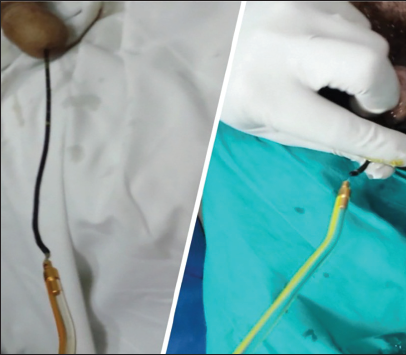Objective: To evaluate the morbidity of the magnitip double-J stent (DJ), compare its morbidity to the standard stent, and evaluate the possibility of retrieving the magnetic tip of the DJ stent without cystoscopy.
Material and methods: A total of 50 patients having a lower ureteric stone, who underwent uretroscopic stone retrieval and required the use of a DJ, were randomly assigned to 2 groups, each containing 25 patients. Patients in group A were subjected to exploration with a uretroscope and a magnitip DJ while those in group B received a uretroscope and a standard DJ. The morbidity of both types of DJs was assessed by the Arabic version of the ureteral stent symptom questionnaire (USSQ).
Results: There was a high level of statistically significant differences between the two groups with regards to the total score of the USSQ, which were higher in group A as compared to group B (126.96±14.76 vs. 98.24±12.9) (p=0.001). Further, the cost of the total procedure was significantly higher in group B (9600±1456.59 vs. 8444±783.73) (p=0.001). No statistically significant difference was found between both groups regarding the application, retrieval accuracy, and discomfort caused by DJ removal.
Conclusion: The morbidity caused by the magnetic DJ was found to be higher. However, the removal of the magnetic DJ was less costly than the standard DJ.
Cite this article as: Farouk A, Tawfick A, Hasan M, Abuftira AA, Maged WA. Can magnitip double-J stent serve as a substitute for a standard double-J stent? Turk J Urol 2019; 45(6): 437-43.

.png)
.jpg)
.png)
.png)
